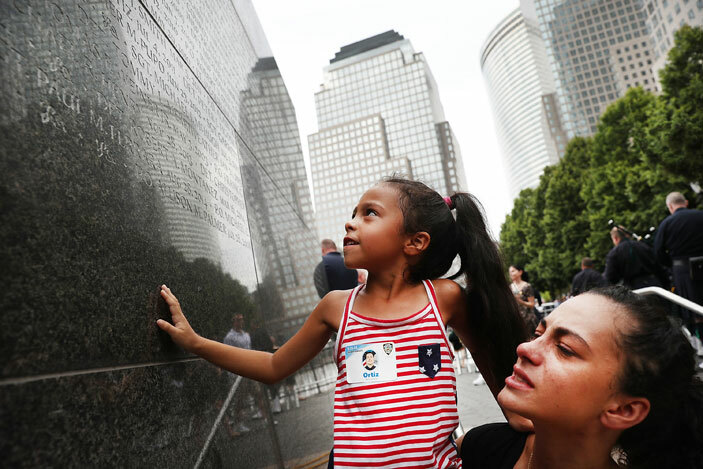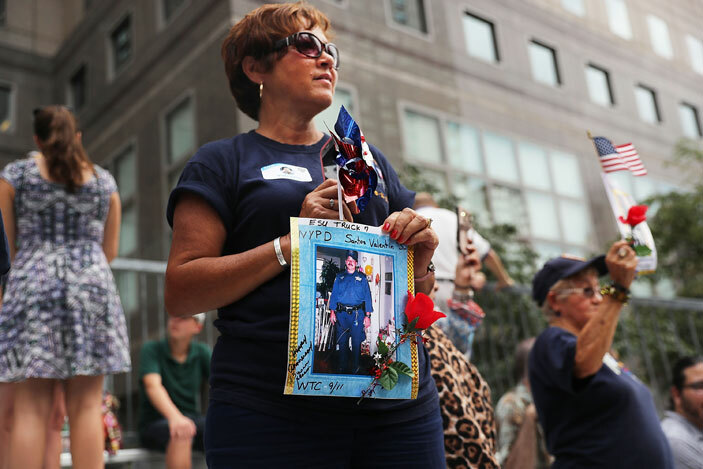Bill allowing 9/11 victims to sue Saudi heads to Obama
The government of Saudi Arabia, a US ally but also the home nation to 15 of the 19 September 11 hijackers, has worked hard to see the bill defeated.
PIC: Members of the NYPD Emerald Society Pipes and Drums band pass a painting of NYPD Deputy Chief Steve Bonano, who died from a rare form of blood cancer believed to be related to his time working at Ground Zero on September 9, 2016 in New York City. Families, friends and police gathered at a wall commemorating fallen officers following a police procession in Lower Manhattan to mark the 15th anniversary of the 9/11 attacks and the officers who were killed during and after the event. Spencer Platt/Getty Images/AFP
The US House of Representatives passed legislation Friday that would allow relatives of victims of the 9/11 attacks to sue Saudi Arabia for compensation -- a move the White House has threatened to veto.
The Justice Against Sponsors of Terrorism Act was approved in the House by unanimous voice vote some four months after its Senate passage -- and only two days before the 15th anniversary of the September 11, 2001 attacks.
The government of Saudi Arabia, a US ally but also the home nation to 15 of the 19 September 11 hijackers, has worked hard to see the bill defeated.
But it now heads to President Barack Obama's desk, where it faces an uncertain future.
The White House again signaled Friday it would veto the measure, because it would essentially waive the doctrine of sovereign immunity that protects nation states from civil suits or criminal prosecution.
 Bernadette Ortiz holds up her daughter Adriana as she looks for the name of her grandfather fallen New York City Police officer Edwin Ortiz at a wall commemorating fallen officers on September 9, 2016 in New York City. Spencer Platt/Getty Images/AFP
Bernadette Ortiz holds up her daughter Adriana as she looks for the name of her grandfather fallen New York City Police officer Edwin Ortiz at a wall commemorating fallen officers on September 9, 2016 in New York City. Spencer Platt/Getty Images/AFP
But its easy passage in both chambers of Congress raises the specter of a veto override, which requires a two-thirds vote in the House and Senate. It would be the first time Obama would be dealt such a blow during his presidency.
"This legislation would change long-standing, international law regarding sovereign immunity," White House spokesman Josh Earnest said back in May, after the Senate unanimously approved the bill.
"The president of the United States continues to harbor serious concerns that this legislation would make the United States vulnerable in other court systems around the world," Earnest said.
The measure, known as JASTA, would allow attack survivors and relatives of terror victims to pursue cases in federal court against foreign governments and demand compensation if such governments are proven to bear some responsibility for attacks on US soil.
Senator John Cornyn, a sponsor of the original legislation, said he hopes Obama signs JASTA into law.
"Today's vote sends an unmistakable message that we should combat terrorism with every tool we have, and that the families of those lost in attacks like that on September 11th should have every means at their disposal to seek justice," Cornyn said.
 Family members of fallen officers watch a procession in Lower Manhattan to mark the 15th anniversary of the 9/11 attacks and the police officers who were killed during and after the event on September 9, 2016 in New York City.
Family members of fallen officers watch a procession in Lower Manhattan to mark the 15th anniversary of the 9/11 attacks and the police officers who were killed during and after the event on September 9, 2016 in New York City.
'Blood on its hands?'
Under current law, victims of terror attacks can only sue countries officially designated by the State Department as sponsors of terrorism, such as Iran and Syria.
No official Saudi complicity in the Al-Qaeda attacks of 9/11 has been proven, and the kingdom has never been formally implicated. It is not a designated sponsor of terrorism.
In February, Zacarias Moussaoui, dubbed the 20th hijacker, told US lawyers that members of the Saudi royal family donated millions of dollars to Al-Qaeda in the 1990s.
The Saudi embassy denied Moussaoui's claims. But his accusations revived debate over whether the Obama administration should release a still-classified 28-page section of the 9/11 Commission Report.
The documents were finally declassified and released in mid-July. They showed that while the United States probed links between the government of Saudi Arabia and the 9/11 attacks, it found multiple suspicions but no proven ties.
Texas Democrat Lloyd Doggett took to the House floor and pointed a finger squarely at Saudi Arabia.
"Wherever you see evidence of radical Islam, that extremism can usually be traced to preachers of hate from Saudi Arabia," he told the chamber.
"The kingdom has blood on its hands. Is it the blood of victims from 9/11? Possibly," he added.
"For our government to obstruct the 9/11 victims, their families, from seeking the truth about Saudi Arabia and its involvement is just flat wrong."